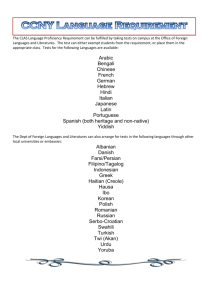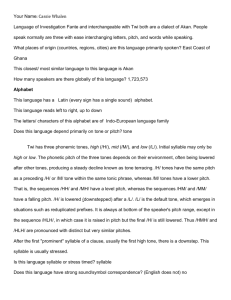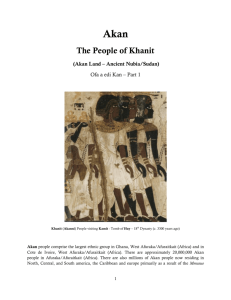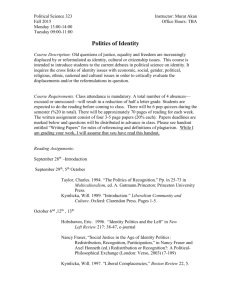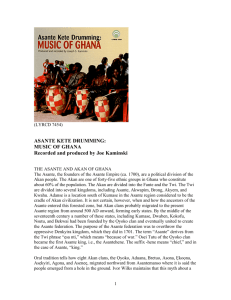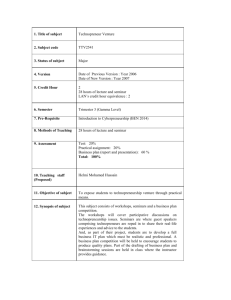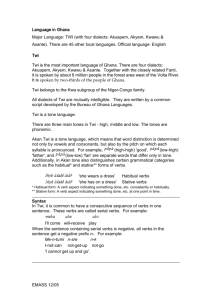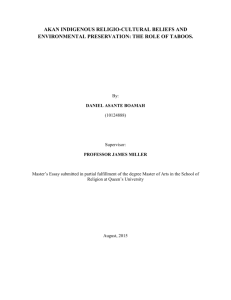Twi - National African Language Resource Center
advertisement
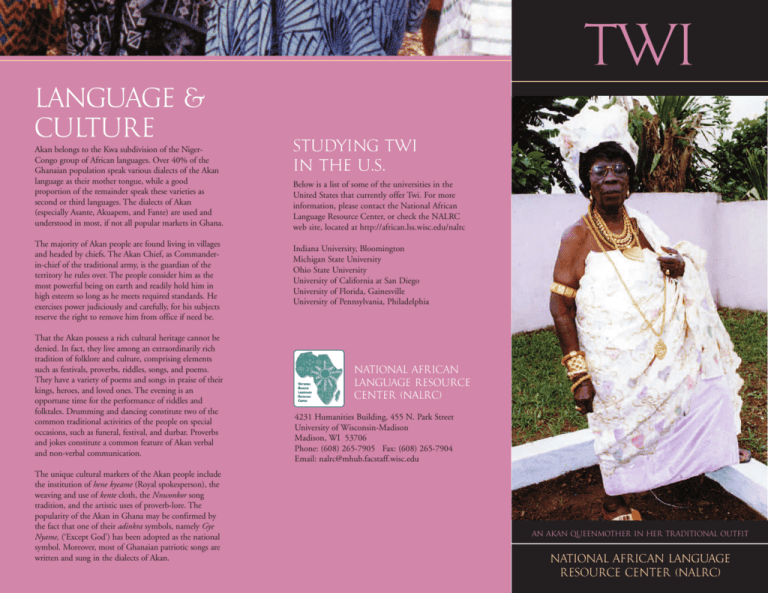
TWI Language & Culture Akan belongs to the Kwa subdivision of the NigerCongo group of African languages. Over 40% of the Ghanaian population speak various dialects of the Akan language as their mother tongue, while a good proportion of the remainder speak these varieties as second or third languages. The dialects of Akan (especially Asante, Akuapem, and Fante) are used and understood in most, if not all popular markets in Ghana. The majority of Akan people are found living in villages and headed by chiefs. The Akan Chief, as Commanderin-chief of the traditional army, is the guardian of the territory he rules over. The people consider him as the most powerful being on earth and readily hold him in high esteem so long as he meets required standards. He exercises power judiciously and carefully, for his subjects reserve the right to remove him from office if need be. That the Akan possess a rich cultural heritage cannot be denied. In fact, they live among an extraordinarily rich tradition of folklore and culture, comprising elements such as festivals, proverbs, riddles, songs, and poems. They have a variety of poems and songs in praise of their kings, heroes, and loved ones. The evening is an opportune time for the performance of riddles and folktales. Drumming and dancing constitute two of the common traditional activities of the people on special occasions, such as funeral, festival, and durbar. Proverbs and jokes constitute a common feature of Akan verbal and non-verbal communication. The unique cultural markers of the Akan people include the institution of hene kyeame (Royal spokesperson), the weaving and use of kente cloth, the Nnwonkor song tradition, and the artistic uses of proverb-lore. The popularity of the Akan in Ghana may be confirmed by the fact that one of their adinkra symbols, namely Gye Nyame, (‘Except God’) has been adopted as the national symbol. Moreover, most of Ghanaian patriotic songs are written and sung in the dialects of Akan. Studying TWI in the U.S. Below is a list of some of the universities in the United States that currently offer Twi. For more information, please contact the National African Language Resource Center, or check the NALRC web site, located at http://african.lss.wisc.edu/nalrc Indiana University, Bloomington Michigan State University Ohio State University University of California at San Diego University of Florida, Gainesville University of Pennsylvania, Philadelphia National African Language Resource Center (NALRC) 4231 Humanities Building, 455 N. Park Street University of Wisconsin-Madison Madison, WI 53706 Phone: (608) 265-7905 Fax: (608) 265-7904 Email: nalrc@mhub.facstaff.wisc.edu An Akan queenmother in her traditional outfit National African Language Resource Center (NALRC) Why Study TWI? Who Speaks TWI? Twi is a cover term for some of the dialects of Akan, but some people equate it with the Akan language itself. In fact, the Akan people speak the various dialects of Akan and NOT the Akan language per se. The choice of the variety of Akan to teach and learn is often made from the dialects that have so far been reduced to writing, namely Asante, Akuapem (Akwapim), and Fante, which are mutually intelligible. Twi is now spoken and understood in virtually all parts of Ghana in West Africa. This means that visitors to Ghana should have no problem with communication once they know English, the official language, and Twi. People and History Moreover, researchers from various disciplines, including history, anthropology, linguistics, literary studies, and folklore have a lot to learn from Ghana in general, and the Akan group in particular. The slave castles at Elmina and Cape Coast are among the historical monuments to take a look at. Also, the Asante sub-group of the Akan people is known to have had powerful leaders, warriors, and heroes during the periods of inter-ethnic wars. We remember King Osei Tutu, who is known to have united the Asante nation; and Yaa Asantewaa, Queenmother of Ejisu, who led the Asante army against the British in 1900. Also, the numerous traditional materials that surround the Akan should be useful to anthropologists, linguists, folklorists, and scholars from other disciplines who are interested in verbal art. Not only does the study of Twi help students to satisfy foreign language requirements, but also it enables them to learn the language as well as the various cultural practices of the Akan people. Also, there are studyabroad programs between American and Ghanaian universities, which offer American students the opportunity to polish their skills in Twi abroad, communicating with native speakers on and off campus. Twi (i.e. Asante-Twi or Akuapem-Twi) is spoken by two of the sub-groups of the Akan people, namely the Asante and Akuapem. The Akan are made up of a variety of ethnic groups found in the southwestern and southcentral portions of Ghana. These groups include the Asante, Bono, Akuapem, Fante, Wassa, Akyem, and Kwahu. Some speakers of the dialects of Akan are found in the southeastern part of La Côte d’Ivoire, on Ghana’s western border. The Akan people are predominantly farmers, hunters, miners, traders, wood-carvers, and fishermen. The origin of the Akan is not too clear, but some scholars have argued that the various Akan kingdoms were founded by refugees from the twenty-seven confederated states of Kumbu after its destruction by Songhay in about 1470. It is, however, well known that the various ethnic groups that constitute the Akan were independent traditional states, who used to go to war against each other for dominance and growth. The most powerful of the groups was the Asante, who reached their peak of prominence during the reign of King Osei Tutu. The Asante state was colonized in 1901 by the British, who had annexed the Fante in 1874 to the Gold Coast Colony. The Gold Coast (i.e. the present day Ghana) finally gained her independence from the British on Saturday, 6th March, 1957, under Osagyefo Dr. Kwame Nkrumah. An Akan King and Queenmother sitting in state. A sub-Akan group from Chicago in a procession. The present-day Akan are a stratified society, governed by chieftaincy. The hierarchy in the Akan political structure may be exemplified by the Asante system of government, comprising the King of Asante (Asantehene), the Queenmother of Asante (Asantehemmaa), Commander of the Guards, Council of State, and Overseer of the King’s court. One important point with regard to Akan chieftaincy is that the King is nominated by the Queenmother, who is often considered as the owner of the state and special adviser to the King. Twi students pose with their instructor.
